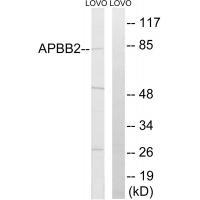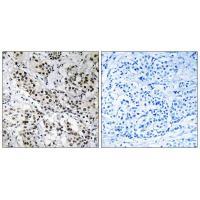

| WB | 咨询技术 | Human,Mouse,Rat |
| IF | 咨询技术 | Human,Mouse,Rat |
| IHC | 1/50-1/100 | Human,Mouse,Rat |
| ICC | 技术咨询 | Human,Mouse,Rat |
| FCM | 咨询技术 | Human,Mouse,Rat |
| Elisa | 咨询技术 | Human,Mouse,Rat |
| Aliases | amyloid beta A4 precursor protein-binding family B member 2; Fe65-like protein; |
| Entrez GeneID | 323; |
| WB Predicted band size | 83kDa |
| Host/Isotype | Rabbit IgG |
| Antibody Type | Primary antibody |
| Storage | Store at 4°C short term. Aliquot and store at -20°C long term. Avoid freeze/thaw cycles. |
| Species Reactivity | Human,Mouse |
| Immunogen | Synthesized peptide derived from internal of human APBB2. |
| Formulation | Purified antibody in PBS with 0.05% sodium azide. |
+ +
以下是关于APBB2抗体的3篇参考文献,按文献名称、作者和摘要内容简要概括:
1. **"Amyloid beta protein precursor interacts with a novel transmembrane protein in neurons"**
- **作者**: Okamoto T, Takeda S, Giambarella U, et al.
- **摘要**: 该研究通过酵母双杂交系统鉴定了APBB2与淀粉样前体蛋白(APP)的相互作用,并利用特异性抗体证实了APBB2在神经元中的定位及其在调节APP加工中的作用。
2. **"The Fe65 adaptor protein regulates the subcellular localization of the amyloid precursor protein"**
- **作者**: Guenette SY, Chen J, Jondro PD, et al.
- **摘要**: 本文通过免疫共沉淀和Western blot分析,使用APBB2抗体揭示了Fe65家族蛋白(包括APBB2)如何影响APP的亚细胞定位和淀粉样β生成,提示其在阿尔茨海默病病理中的潜在作用。
3. **"Functional analysis of the amyloid precursor protein family in Drosophila"**
- **作者**: Carmine-Simmen K, Proctor T, Tschäpe J, et al.
- **摘要**: 研究利用果蝇模型和APBB2特异性抗体,发现APBB2同源物参与调控神经突触发育和APP家族蛋白的运输,为理解其神经功能提供了进化保守性证据。
以上文献均涉及APBB2抗体的实验应用,涵盖其与APP的相互作用、亚细胞定位调控及在神经发育中的功能。如需具体发表信息(期刊、年份),可进一步补充。
The APBB2 (Amyloid Beta Precursor Protein Binding Family B Member 2) antibody is a tool used to study the APBB2 protein, a member of the Fe65 protein family that interacts with the amyloid precursor protein (APP). APBB2 contains two phosphotyrosine-binding domains (PTB) and a WW domain, enabling interactions with multiple proteins involved in transcriptional regulation, cell adhesion, and signal transduction. It is implicated in APP processing pathways linked to Alzheimer's disease (AD), where amyloid-beta peptide accumulation is a hallmark. APBB2 also plays roles in neuronal development, synaptic plasticity, and cancer progression, with studies highlighting its overexpression in certain tumors, such as glioblastoma and breast cancer.
Antibodies targeting APBB2 are essential for detecting its expression, localization, and post-translational modifications in tissues or cell lines. They facilitate techniques like Western blotting, immunohistochemistry, and co-immunoprecipitation to explore APBB2's interactions with APP, transcription factors, or other partners. Research using APBB2 antibodies has contributed to understanding its dual roles in neurodevelopment and disease pathogenesis, particularly in AD and cancer metastasis. However, variability in antibody specificity across isoforms (e.g., APBB2 has multiple splice variants) requires careful validation. Overall, APBB2 antibodies remain critical for dissecting its biological functions and therapeutic potential.
×